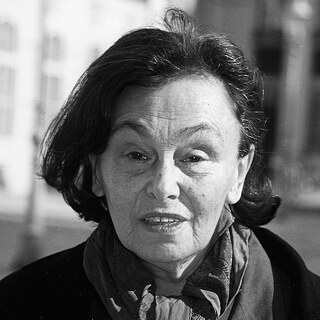Ilse Aichinger

(born 01.11.1921 in Vienna; died 11.11.2016 in Vienna), author
As the daughter of a Jewish doctor, Ilse Aichinger suffered persecution under the NS regime. Members of her family were murdered by the National Socialists. Ilse Aichinger studied medicine in Vienna after the end of the Second World War. Her work published in 1945, Das vierte Tor (The Fourth Gate) is about National Socialist concentration camps. Her only novel, Die größere Hoffnung (Herod's Children), an autobiographical depiction of the Vienna war years written in an allegorical style, was published in 1948. In 1949/50 Ilse Aichinger worked as a proof-reader for a publisher in Frankfurt/Main, and in 1950/51 she was an assistant to Inge Aicher-Scholl at Ulm School of Design. In 1953 she published her first radio play Knöpfe (Buttons), which was followed by further radio plays. Her complete works, which are characterised by linguistic economy and subversive language criticism were published compiled into various anthologies. Her most recent publications were the partially autobiographical works Film und Verhängnis. Blitzlichter auf ein Leben (Film and Fate. Flashlights on a Life; 2001), Unglaubwürdige Reisen (i.e. Incredible Journeys; 2005) and Subtexte (i.e. Sub-texts; 2006). The work of this author, who is considered a definitive influence in German post-war literature, has received a number of important literary prizes. These include for instance the Group 47 prize for Spiegelgeschichte (i.e. Mirror Story) in 1952, the Petrarca Award in 1982, the Franz Kafka Prize in 1983, the Austrian State Prize for Literature in 1995, the Joseph Breitbach Prize in 2000, and the Grand Art Prize of the State of Salzburg in 2015.
Lebendiges Museum Online Ilse Aichinger